In the 1990s, the then government of Jamaica appointed a failed central banker in an African country as governor of Bank of Jamaica in combination with a failed Minster of Finance they collectively destroyed the Jamaican economy and the financial sector by maintaining stiflingly high interest rates that have set back this country for decades.
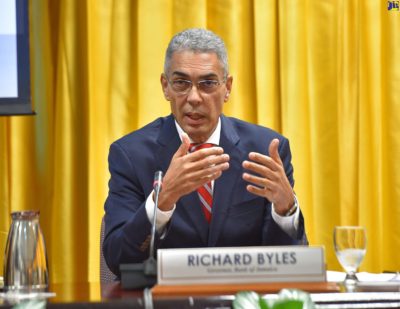 Now that the country is recovering from those calamitous years, the country employed what is in effect a retired non practicing economist as head of the central bank. No major country in the world has placed such a person as head of their central bank.
Now that the country is recovering from those calamitous years, the country employed what is in effect a retired non practicing economist as head of the central bank. No major country in the world has placed such a person as head of their central bank.
In a letter to the Minister of Finance around April last year Byles advised the MOF why rates had to be kept at levels well below inflation. According, to the central bank that was to facilitate growth and any increase, would trim the growth level quite a bit.
In reality, GOJ was the major beneficiary of the low interest rates and lenders to banks were subsidizing the goverment by getting little interest on their money.
This publication had repeated disagreed with the BOJ policy of abnormally low interest rates as having disastrous consequences for the economy. The chickens are now rooting and the central bank is panicking with the latest measured knee-jerk 1.5 percent in its overnight rate to 4 percent.
Up to June last year Bank of Jamaica (BOJ) held the policy interest rate unchanged at 0.50 percent per annum. According to the Central Bank, the decisions taken then by Bank of Jamaica are aimed at ensuring that the annual increase in the prices of consumer goods and services remains within the Bank’s inflation target of 4 to 6 percent.
The decision to hold the policy rate unchanged was made by a unanimous vote by the Bank’s Monetary Policy Committee (The Committee/MPC). This decision was based on the MPC’s assessment that, despite recent increases in international commodity prices, the existing stance of monetary policy remains appropriate to support inflation within the target range over the next two years. The Bank’s accommodative monetary policy posture is also aimed at supporting a recovery in economic activity in Jamaica.
Something seems to have blinded the eyes of the MPC who met again in August but only move rates by a huge 100 basis point then and now 1.5 percent. All talk of growth has completely gone from the justification for keeping rates well below inflation.
The message seems clear, the central bankers and the MPC are clueless as to what they are dealing with.
Time for Byles to go
Bank of Jamaica jacks up interest rate 1.5%
Bank of Jamaica (BOJ) jacks up its policy interest rate offered to deposit-taking institutions on overnight placements by 150 basis points to 4 percent per annum, effective 21 February 2022 and brings to four the number of increases implemented since September 2021.
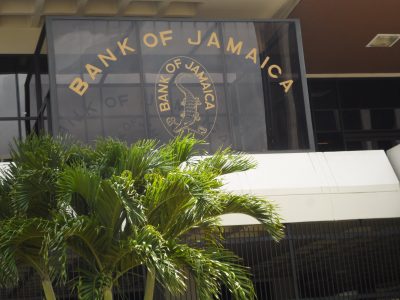
BOJ interest cuts overnight rate.
According to a release from BOJ the bank also decided to pursue stronger measures to contain Jamaican dollar liquidity expansion and to maintain stability in the foreign exchange market. Finally, consistent with meeting its inflation target sustainably in the medium term, the MPC agreed to consider maintaining or expanding its suite of policy measures at subsequent policy meetings. This position is subject to inflation, inflation expectations and other macroeconomic data evolving as projected.
In general, monetary policy decisions taken by Bank of Jamaica are aimed at ensuring that the annual increase in the prices of consumer goods and services (i.e. inflation) remains within the Bank’s inflation target of 4 percent to 6 percent, the bank stated.
BOJ CD rates holding steady
 Fresh from hiking their overnight policy rate by 0.50 percent to 2 percent, Bank of Jamaica latest CD offer produced an average yield of 4.34 percent, with the lowest bid coming in at 4 percent.
Fresh from hiking their overnight policy rate by 0.50 percent to 2 percent, Bank of Jamaica latest CD offer produced an average yield of 4.34 percent, with the lowest bid coming in at 4 percent.
BOJ offered to sell $9.5 billion of CDs and attracted twice that amount at $18.24 billion. The highest rate payable by the central bank is 4.475 percent, with only 44 percent of the amount of the bid being successful.
The previous CD auction held on November 9 attracted $17 billion for the $12 billion offered and resulted in an average yield of 4.22 percent, with the highest successful bidder getting 91 percent of the amount they placed in the auction with an interest rate of 4.65 percent.
BOJ now paying over 4% on CDs
Interest rates rose to 4.17 percent in the latest Bank of Jamaica 30 day CD offering of 12 billion on Wednesday last week, up from 3.28 percent on Wednesday, October 6 and well over the new overnight rate of 1.5 percent.
 Having settled at a low of just over 0.5 percent for the past two years, the latest rate marks a significant shift in a very short time frame, a development that investors should watch carefully.
Having settled at a low of just over 0.5 percent for the past two years, the latest rate marks a significant shift in a very short time frame, a development that investors should watch carefully.
At the recent auction, the central bank received 53 bids amounting to $14 billion for $12 billion on offer, 46 bids were successful up to 5.27 percent and came after BOJ increased their overnight rate to 1.5 percent. The total nominal outstanding amount for the 30-day CDs $46.5 billion, similar to the week before, but well above the $35.5 billion at the end of July.
At the same time, the Government of Jamaica Treasury bill auction on Wednesday, October 10, rates on the three tenors on offer ended with an average rate of 2.165 percent for the 90 day offer that attracted $2.246 billion for the $700 million on offer. The 181 days offer saw $1.974 billion chasing the $700 million offered and resulted in an average rate of 2.75 percent and the 273 days T-bill pulled in $1.865 billion for $800 million offered and resulted in an average rate of 3.69 percent.
The range for yields for full allotment is 1.45 percent to 2.85 percent for the 91 day T-Bill, 1.5 percent to 3.05 percent or the 182 days T-bill and 2.41 percent to 4.75 percent for the longest dated bill.
On Thursday, October 21, the central bank will auction $4.5 billion 365 days Certificate of deposit.
Bank of Jamaica hikes ON rate to1.5%
 Bank of Jamaica, the central Bank of Jamaica day raise their Over Night interbank rate by one percentage to 1.5 percent. The rise follows the Bank’s announcement at the end of August that the announced the decision to consider commencing a tightening of monetary policy at the next meeting of the Bank’s Monetary Policy Committee in September and to immediately implement other measures aimed at moderating inflation expectations, including the containment of Jamaican dollar liquidity expansion.
Bank of Jamaica, the central Bank of Jamaica day raise their Over Night interbank rate by one percentage to 1.5 percent. The rise follows the Bank’s announcement at the end of August that the announced the decision to consider commencing a tightening of monetary policy at the next meeting of the Bank’s Monetary Policy Committee in September and to immediately implement other measures aimed at moderating inflation expectations, including the containment of Jamaican dollar liquidity expansion.
A precursor to the policy rate increase and further tightening of the financial market, the CDs offered by the BOJ on September 29 resulted in a continuation in the rise of CD rates to 2.59 percent from 0.59 percent at the end of July.
The overnight rate was last cut to 0.50 percent in August 2019. It remained at that level up to the end of September. It ultimately dragged other rates in the system down and resulted in significant savings in interest costs for the government.
Consistent with meeting its inflation target sustainably in the medium term, the MPC agreed to continue increasing the Bank’s policy rate and by extension raising real interest rates, which are currently significantly negative and maintaining or intensifying the accompanying measures. This position is subject to inflation and other macroeconomic data evolving as projected.
Bank of Jamaica sees contraction & growth
Bank of Jamaica is forecasting a contraction in the economy in the range of 10 to 12 percent in 2020/21 fiscal year before partially recovering with growth in the range of 4 to 8 percent in the 2022 fiscal year to March.

BOJ interest holds overnight rate.
“A projected decline in real GDP for the March 2021 quarter is expected to be mainly reflected in Hotels & Restaurants, Transport, Storage & Communication and Other Services,” the central bank states. “The overall decline for the quarter, which is expected to be smaller than the contractions of the previous three quarters, is largely based on the adverse, albeit receding, impact of the global COVID-19 pandemic on travel and entertainment activities,” the bank’s release stated. The Bank’s current assessment suggests that the risks to the GDP forecast are balanced.
Monetary Policy
“While the impact of the Covid-19 virus has recently led to an increase in the stringency of measures in Jamaica to control its spread, there remains optimism about future GDP growth as vaccination programmes have commenced both locally and globally. Bank of Jamaica has maintained an accommodative monetary policy stance aimed at supporting a speedy economic recovery once this crisis passes. Bank of Jamaica remains committed to ensuring that inflation remains low and stable, within its target and, at the same time, is prepared to take all necessary actions to ensure that Jamaica’s financial system remains sound”, the release went on to state.
“The Bank intends to maintain this monetary policy stance until there are clear signs that economic activity in Jamaica is returning to pre-COVID-19 levels.” Against this background, the central bank has held the policy rate at the historic low level of 0.50 percent based on its assessment that inflation will generally continue to remain within the target of 4 to 6 percent over the next two years. The bank’s accommodative monetary policy posture is also aimed at supporting a recovery in economic activity in Jamaica, a release from the bank states.
BOJ overnight rate still 0.50%
Bank of Jamaica announced the decision to maintain its accommodative monetary policy stance by holding the overnight policy rate offered to deposit-taking institutions at 0.50 percent per annum.
 In announcing the decision to hold the rate Governor of the Bank of Jamaica, Richard Byles, stated, “I think it is important to emphasize that Jamaica’s financial system remains sound, well-capitalized and its current holdings of Jamaica Dollar liquid balances remain adequate. To ensure that orderly conditions are maintained, Bank of Jamaica has taken some pre-emptive measures to assure financial institutions and the public of adequate access to both Jamaica Dollar and foreign currency liquidity during this challenging period. There are a total of eight such measures, three in respect of foreign currency and five to do with Jamaica dollar liquidity.”
In announcing the decision to hold the rate Governor of the Bank of Jamaica, Richard Byles, stated, “I think it is important to emphasize that Jamaica’s financial system remains sound, well-capitalized and its current holdings of Jamaica Dollar liquid balances remain adequate. To ensure that orderly conditions are maintained, Bank of Jamaica has taken some pre-emptive measures to assure financial institutions and the public of adequate access to both Jamaica Dollar and foreign currency liquidity during this challenging period. There are a total of eight such measures, three in respect of foreign currency and five to do with Jamaica dollar liquidity.”
The central bank introduced a number of measures including the continued support of the foreign exchange needs of businesses in the real sector through direct sales to authorized dealers and Cambios, as needed. Increased limit on the foreign currency net open positions of authorized dealers by 5 percentage points.
The central bank states that it stands ready to expand the volume of foreign currency swap arrangements with authorized dealers. The stock of outstanding swap contracts now totals US$86 million.
The Bank commenced a bond-buying programme of GOJ securities on the secondary market from financial institutions and is prepared to effect early redemption BOJ securities. The Bank has so far purchased $26.3 billion GOJ instruments.
BOJ removed the limit on the amounts that deposit-taking institutions (DTIs) can borrow overnight without being charged a penal rate.
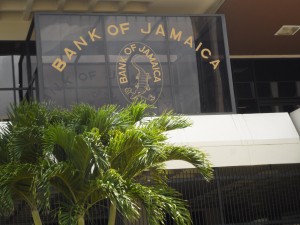
BOJ interest cuts overnight rate.
Effective today, we have re-introduced a longer-term lending facility, whereby Jamaica Dollar liquidity will be made available to DTIs for periods of up to six months. This enhances the ability of these institutions to secure their liquidity needs over a longer horizon.
We will re-activate an intermediation facility where BOJ will use its balance sheet to facilitate transactions between holders of liquid balances and others who require liquidity if needed. This facility should support a more even distribution of liquidity in the financial system in a context where institutions who could not access inter-bank loans because of the limits placed on them by lenders, can now do so indirectly with the central bank standing in the middle of the transaction.
As of 25 March 2020, the total value of liquidity assistance provided by the BOJ to the market via its short-term lending facilities and its asset purchase programme amounted to $57 billion.
“We believe that these measures will help to facilitate the smooth functioning of the credit market. Support inflation remaining within the inflation target of 4 percent to 6 percent over the ensuing eight quarters and will augment the fiscal measures already put in place by the Government,“ the BOJ governor stated.
The economic outlook, however, is characterized by significant uncertainty relating to the spread of the virus and the consequent depth and duration of the economic impact. In the near term, some upward price pressures can be expected due to supply chain disruptions and weather-related increases in agricultural prices. However, these will be offset by a sharp decline in oil prices and weaker consumer spending power, given the expected decline in economic activity. If the domestic and external responses to the pandemic have to be sustained for most of next fiscal year, the Jamaican economy will contract significantly. In this context, we expect inflation to be at the lower end of the 4.0 percent to 6.0 percent range over the fiscal year as well as the ensuing eight quarters.
The near-term outlook now, however, reflects significant challenges and heightened uncertainty due to COVID-19. Our monetary policy measures, along with the Government’s fiscal stimulus, are aimed at mitigating the impact of this pandemic on the economy and supporting a speedy recovery once the crisis has passed. BOJ states that it will continue to monitor the effects of COVID-19 on the economy closely. The central bank also indicates that it stands ready to deploy additional measures to ensure the continued smooth flow of liquidity to all participants in the Jamaican financial system and to maintain orderly conditions within the foreign exchange market. Actions the BOJ could take include a reduction of the policy rate and the cash reserves requirement,
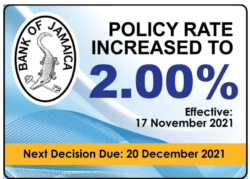 It will also make saving in Jamaican dollars more attractive and borrowing in Jamaican dollars more expensive. These effects are intended to temper the demand for foreign currency and hence moderate the pace of depreciation in the exchange rate; and, generally, reduce demand in the economy and with it the ability of businesses to pass on price increases to consumers.”
It will also make saving in Jamaican dollars more attractive and borrowing in Jamaican dollars more expensive. These effects are intended to temper the demand for foreign currency and hence moderate the pace of depreciation in the exchange rate; and, generally, reduce demand in the economy and with it the ability of businesses to pass on price increases to consumers.”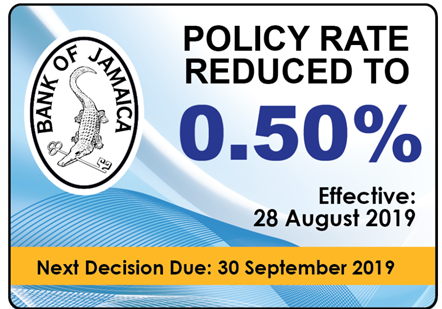 Bank of Jamaica cuts the overnight policy interest rate by 25 basis points to just
Bank of Jamaica cuts the overnight policy interest rate by 25 basis points to just 




